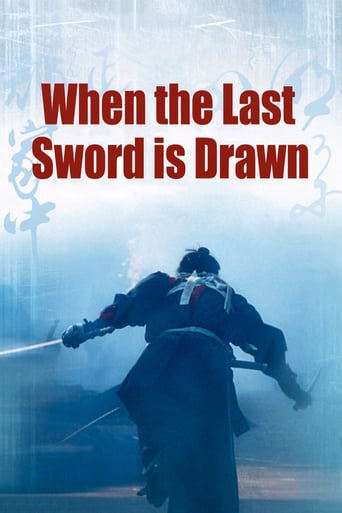tieman64
"When the Last Sword is Drawn" is an intermittently interesting samurai film by director Yojiro Takita. It stars Koichi Sato as Saito Hajime, a samurai who works for the Shinsengumi, essentially a "police force" for Japan's shogun (heriditary military governors). Working alongside Hajime is Yoshimura Kanichiro (Kiichi Nakai). Pragmatic, Kanichiro sees his job in economic terms; a means of earning cash. Hajime, in contrast, believes in old-fashioned notions of feudal loyalty. As Hajime increasingly believes these notions to be morally untenable, he gradually becomes disillusioned. Filled with self-loathing, and finding no value in social customs, relations and traditions, Hajime spends Takita's film courting death.Typical of "revisionist" samurai movies, "When the Last Sword is Drawn" is sceptical of Edo-era values; it portrays a world in transition, anticipates the fall of the Edo period and attempts to sketch the economic realities of 19th century Japan. Like many contemporary samurai movies, it is marred by sentimentality, unnecessary flashbacks and an aesthetic which mistakes "slowness" and "countercliches" for depth. Scored by Joe Hisaishi.6/10 - Interested in Samurai films? See Kurosawa's "Ran", Okamoto's "Samurai Assassin" and "Sword of Doom", "47 Ronin", "Kiru", Hiroshi Inagaki's "Samurai Trilogy", "Goyokin" (1969), "Chushingura" (1962), and the great Masaki Kobayashi's "Samurai Rebellion" and "Harakiri". See too Yamada's "Samurai Trilogy" ("Twilight Samurai", "The Hidden Blade" and "Love and Honor"). For mindless gore, seek "13 Assassins" and the "Lonewolf and Cub" series.
Milo Milosovic
I was drawn to this 2003 Japanese film for a variety of reasons. a) it's director Yôjirô Takita was responsible for one of my favourite films in recent years, Departures (Okuribito) b) It's been mentioned in the same breath as the quite stupendous "Twilight Samurai" (Tasogare Seibei) and c) I'm just a sucker for 19th Century end of the Shogunate/ Rise of the Emperor guff.All the ingredients are there in the set-up Yoshimura is a lower class Samurai who is struggling to support his wife and children. He abandons them in search of higher pay to support them and joins the notorious Shinsengumi clan. All the usual themes are here. The nature of honour; the conflict between family loyalty and clan loyalty; the passing of an era.Unfortunately the film is hamstrung by a number of problems. Firstly, there is a level of sentimentality which teeters into the mawkish at times. Secondly, the narrative is framed by a dual character flash-backs which are unconvincing, confusing and jarring. Thirdly, whilst the two lead characters are deliberately set as opposites the performances of the two leads teeter into the realms of Samurai TV soap pastiche. Indeed when you compare them to the Hiroyuki Sanada's poised and subtle performance in the melancholic and restrained Twilight Samurai they fall-down badly.Having said all that it's entertaining enough. Has some solid set-pieces and a suitably authentic feel. But that's just not enough. Ultimately, it's a major disappointment. The poster's great though.
mmushrm
Just finished watching this movie and have to say that it was excellent.The movie is set in the last days of the Tokugawa Shogunate and the Boshin war. It revolves around a poor samurai who joins the Shinsengumi to provide for his family.The opening of the movie is a little slow and confusing but persevere and you will be greatly rewarded. Doing a quick read up about the shinsengumi will ease the confusion. This movie has all the elements of jidaigeki movie; samurai, honour, swordfights, duty.The ending may be a tad sentimental, it did bring a tear to my eye, but it does end the movie right.Highly recommended.
eagleknight98
This movie is about an honest samurai who lived in an era of change in the Japanese tradition. Limitied by his clan's rights on him, he had to make a choice of scarifying his honor, or his family.Those few lines were put in a captivating sequence and outstanding act. The director, along with his cast, managed to meta-morph a humble story into an epic that made, even the infrequent fans of Japanese movies, tied to their seats. Not because of CGI or sound effects, rather, it was for the mere character and story development.There was about 15 minutes towards the ending where the story was stretched thin with some prolonged scenes. Nevertheless, this movie was packed with selfless love and courage.If haven't seen this movie, it is time to impress yourself. Just make sure that you have some idea about Japanese culture and history.



